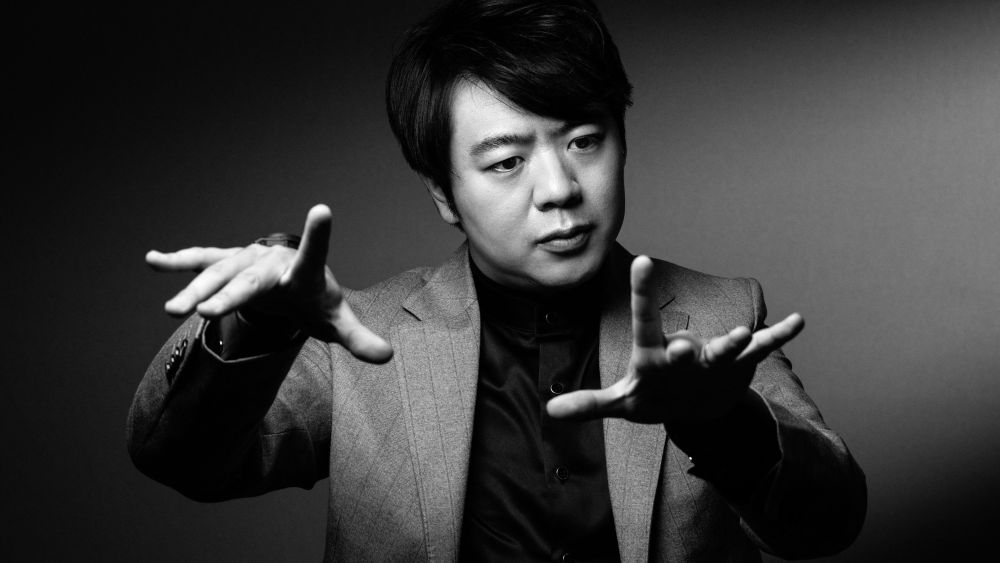Hailed by no less than the New York Times as “the hottest artist on the classical music planet,” Chinese pianist Lang Lang has expanded traditional performance boundaries beyond the usual Bach, Mozart and Chopin to include Disney songs and contemporary film music.
On April 10, he will become one of a handful of classical pianists to receive a star on the Hollywood Walk of Fame. (Among them: Vladimir Horowitz, Arthur Rubinstein, Rudolf Serkin and Ignace Paderewski.) This recognition acknowledges Lang Lang’s connection to movies and his commitment to bringing classical music to younger audiences everywhere. “This is truly a great honor, a great encouragement,” Lang Lang tells Variety from Europe, where he is currently on tour. Now 41, he has spent half his life on stages around the world, stunning listeners with his technical proficiency and annoying critics with his theatricality and showmanship.
The fact is, Lang Lang is immensely popular, and three of the current top 20 bestselling classical albums are his, including his newest on Deutsche Grammophon, a collection of French masterpieces leading off with Camille Saint-Saëns favorite “Carnival of the Animals.”
He characterizes the album as “the very impressionist French music and more vibrant French music. We have everything from Fauré to Ravel to the most beautiful Debussy piece.” Also included: rarely heard music from five lesser-known French female composers from the late 19th and early 20th centuries: Lili Boulanger, Germaine Tailleferre, Mélanie-Hélène Bonis, Louise Farrenc and Charlotte Sohy.
Lang Lang insists that he remains “mostly focused on classical music,” but his departures are notable, and often involve music for movies or TV. French composer Alexandre Desplat recalls hearing Lang Lang play a classical recital as he was beginning work on “The Painted Veil,” John Curran’s 2006 film set in
1920s China.
“I thought he would be the perfect match,” Desplat says. “A virtuoso, a hyper-sensitive piano touch, good spirit to work with … and he’s Chinese! We teamed again on ‘My Week With Marilyn,’ where he played the main theme with soulful beauty.” Desplat won the Golden Globe for his “Painted Veil” score with Lang Lang’s piano.
Since then, the musician has been the featured keyboard soloist on the third and fourth installments of the Hans Zimmer-scored “Kung Fu Panda” series, and on James Newton Howard’s score for “The Nutcracker and the Four Realms.” His prominence in the classical world brought extra attention to Anne Dudley’s theme for TV’s “Poldark” when he performed her prelude as a solo piano piece.
The artist’s 2022 “Disney Book” album remains among his biggest sellers. A grand-scale reconceptualizing of the familiar themes from Disney hits over the years, with Lang Lang’s piano taking center stage, it has proven a hit with kids (and their parents) worldwide.
The Lang Lang Intl. Music Foundation is at the forefront of promoting music education in schools. Says the pianist: “Every time I go to any of our facilitated schools, the kids always ask me, ‘Can you play something from Disney?’
“It’s OK here and there to play, let’s say, ‘Flight of the Bumblebee’ or the ‘Turkish March,’ but after a while, it doesn’t work anymore with the kids. They all ask me to play ‘Frozen’ or ‘Can You Feel the Love Tonight.’ I’m trying to make classical music and piano connect to the Disney films.”
“Disney Book” producer Ron Fair calls him “a complete gentleman. He’s demanding and his mind is super-precise, quick to find tempo variations and musical details. He’s got a very young spirit — there’s a very exuberant, youthful excitement about him and it’s catchy.
“He loves children,” Fair adds. “This whole animation thing is part of him touching the child within. He really gets into the emotionality of the piano and it’s incredible to watch. He disappears into the piece — it’s the instrument, him and the composer, in a crazy jam session.”
Lang Lang often says that his love of music began when, at the age of 2 1/2, he first saw the Tom & Jerry cartoon “The Cat Concerto.” The MGM classic has tuxedo-wearing cat Tom trying to play Liszt’s “Hungarian Rhapsody No. 2” in concert while mouse Jerry torments him. At 13, Lang Lang visited Tokyo Disneyland and first heard “It’s a Small World,” and in 2016 he performed “Let It Go” from “Frozen” at the opening of Shanghai Disney Resort.
Reaching young people is an ongoing theme with Lang Lang, especially through his foundation.
“We aim to inspire more kids to learn music, and bring back music to be part of a school’s curriculum,” he notes. “We have almost 200 schools around the world, with classes and digital keyboards. We are reaching people who don’t necessarily understand classical music and can’t link it to their everyday life.”
Lang Lang believes that the future of classical music depends on education. “We need to do more young people’s concerts. We need to do better on social media. We need to do shorter concerts, invite them to rehearsals, explain our joy of being on stage. We have to get into the local communities and share our love. This is great art, but it’s very far away from the everyday life of people. It’s all about communication, about inspiring, about encouraging kids to do musical studies. Music education will heal their hearts and give them tremendous energy in whatever they do in the future.”
The pianist believes he’s become a better performer since becoming a father three years ago. He says he’s “more sensitive, a more loving person, and that absolutely reflects on my music-making. If you hear me playing now, there is a lot of new storytelling — a very different range of colors and a lot of thoughts behind the note.
“After 20 years on stage, people are starting to realize that I’m actually a more emotional player than a technical player,” he adds. “Technique has to serve the music. The more struggling, the more life experience you have, that helps a lot to feel the pain in the music. It’s the pain, the sadness, that makes people cry.
“Sometimes it’s a good thing that you face challenging moments, even failure. This helps you tremendously to get into the music and find real emotion. Then you have to transfer that into the music-making. Some people have great knowledge, great ideas, great emotions, but when they play you don’t feel it because they don’t know how to adapt them into the keyboard. I have felt much deeper as a pianist in the last five years.”
To producer Fair, there is an important cross-cultural aspect of Lang Lang getting that star on the Walk of Fame at a time when tensions are high between the United States and China. He sees the musician as “one of the few ambassadors who, through music, can join these two forces that have so much on the table — to put all that aside and bring it together with music.”





